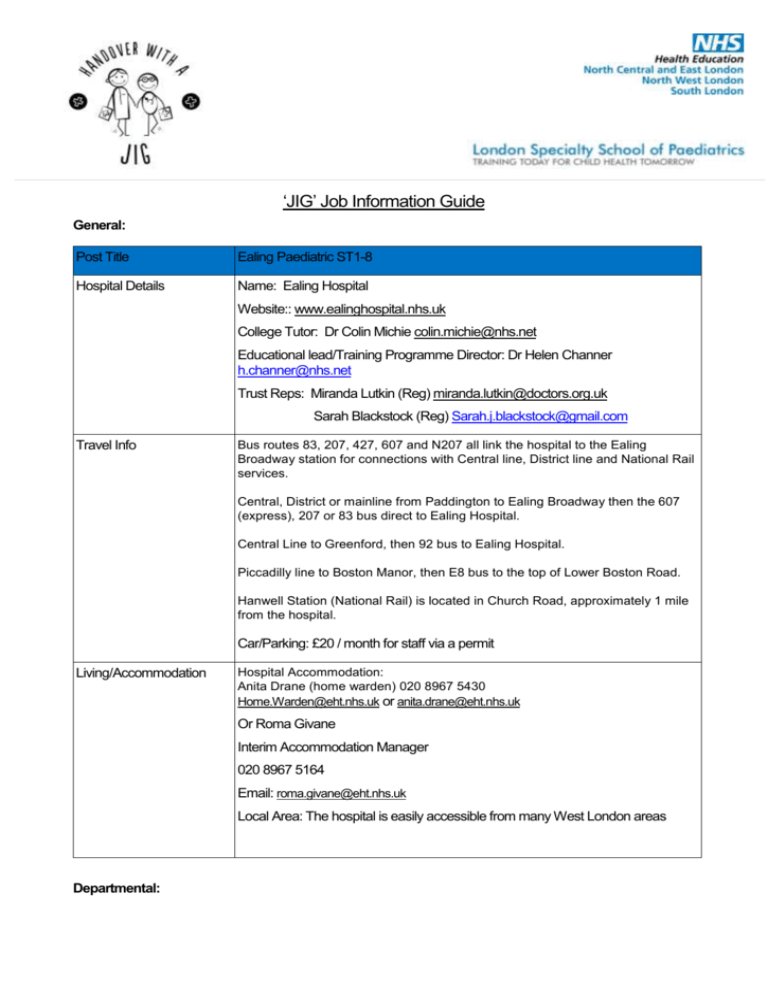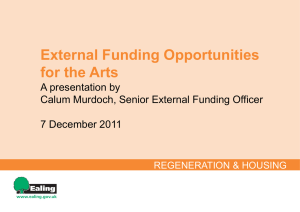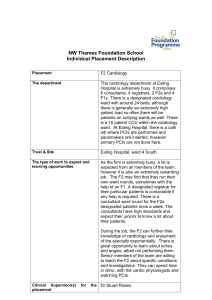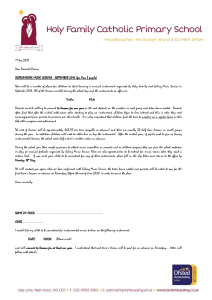View full JIG detail - London School of Paediatrics
advertisement

‘JIG’ Job Information Guide General: Post Title Ealing Paediatric ST1-8 Hospital Details Name: Ealing Hospital Website:: www.ealinghospital.nhs.uk College Tutor: Dr Colin Michie colin.michie@nhs.net Educational lead/Training Programme Director: Dr Helen Channer h.channer@nhs.net Trust Reps: Miranda Lutkin (Reg) miranda.lutkin@doctors.org.uk Sarah Blackstock (Reg) Sarah.j.blackstock@gmail.com Travel Info Bus routes 83, 207, 427, 607 and N207 all link the hospital to the Ealing Broadway station for connections with Central line, District line and National Rail services. Central, District or mainline from Paddington to Ealing Broadway then the 607 (express), 207 or 83 bus direct to Ealing Hospital. Central Line to Greenford, then 92 bus to Ealing Hospital. Piccadilly line to Boston Manor, then E8 bus to the top of Lower Boston Road. Hanwell Station (National Rail) is located in Church Road, approximately 1 mile from the hospital. Car/Parking: £20 / month for staff via a permit Living/Accommodation Hospital Accommodation: Anita Drane (home warden) 020 8967 5430 Home.Warden@eht.nhs.uk or anita.drane@eht.nhs.uk Or Roma Givane Interim Accommodation Manager 020 8967 5164 Email: roma.givane@eht.nhs.uk Local Area: The hospital is easily accessible from many West London areas Departmental: Team Team: Number of consultants: 6 General Paediatric Consultants with additional specialist interests. Clinical Director – John Hutchins Dr Colin Michie - Haematology Dr Ewa Lichtarowich-Krynska – Diabetes and Endocrinology Dr Vivien Chan – Respiratory and Allergy Dr Ramnik Mathur – Neonates Dr Priya Kumar – Diabetes and Endocrinology and Safeguarding Dr Helen Channer – A&E, Dermatology, Safeguarding 4 Community Consultants John Hutchins Sharon Richman Francesca Omisakin Nitu Sengupta Number of registrars: 8 Full time, 2 community with hospital on calls, 1 part-time Number of FY1s: 2 Number of SHOs: 12 (5x ST1-3, 1xFY2, 3xGPVTS and 3x trust SHOs) Plus one SHO does 2x 8.30-5pm days per week. Rota & Responsibilities Rota co-ordinator: Gill Standfield - g.standfield@nhs.net Consultant supervisor - Dr Helen Channer - h.channer@nhs.net Registrar also allocated to co-ordinate the rota. Number of registrars: 8 Full time, 2 in the community with hospital oncalls, 1 part time Short day – 08.30-17:00pm Long day is 8.30- 21.00pm Nights are 20.30- 9.30 Reg rota allocations: 7 nights in 12 weeks and 1 in 4 weekends. Pretty reasonable not overly arduous paediatric registrar 8 week rolling rota. With allocations to cover all of the clinical areas inclusive of clinic allocations whilst trying to provide some continuity of care. Community registrars do nights and on-calls with occasional clinics at Ealing but otherwise have a separate rota. ANNUAL LEAVE IS FULLY FLEXIBLE – YEY! There are natural opportunities to take annual leave in the rota. As with anywhere on-call swaps must be made in order for annual leave to be taken. The only limitation is that there must be a minimum of 4 registrars on shift during the week. Study leave is available for all trainees but has to be signed off by your educational supervisor and Gill Standfield before being implemented. Priority is given to exams with regards to study leave requests. Efforts are made to enable trainees to attend RSM days. Rota requests can be submitted to Gill in advance to accommodate annual leave and study leave requests where possible. Responsibilities This is an appropriate unit in which to consolidate learning gained during your training. The consultants are supportive in their approach whilst encouraging you to develop your own leadership skills and teaching you to trust your clinical abilities and managerial abilities. Allowing you the freedom to grow as a registrar. Ealing serves a unique and diverse population; as a consequence we have a number of children with complex medical problems and see our fair share of patients who present with safeguarding concerns. As a registrar you will consolidate your ability to work under pressure managing an acutely unwell child with a team of juniors with a variety of paediatric clinical experience. A&E/Daycare: Ealing serves a diverse community and has a large patient group with complex medical problems. Although the volume of patients presenting to Ealing may have decreased over the last few years the complexity and severity remains unchanged. On average we have 52 CATS transfers a year and as ever these tend to occur in clusters with multiple retrievals within a 24 hour period at times. You quickly get to know the CATS admin team and they start to recognise your voice. So Ealing is a good place to be if you like your acute peri-PICU paediatrics. Ealing has an Urgent Care Centre based in A&E; patients are triaged to either UCC or A&E. The 4 hour clock is the same! Patients can be referred to Paeds by UCC, A&E docs or the A&E paeds nurses. The registrar is responsible for receiving all of the GP and A&E referrals, stable patients are initially assessed by the Paeds SHO covering A&E. Your activities within the paediatric A&E department are supported by a highly competent group of nursing staff who make the whole process much more enjoyable and efficient. General Paediatric Ward: 12 inpatient beds, 4 PAU beds: This functions as a typical ward with both medical and surgical patients. It’s a divide and conquer approach on the ward to ensure appropriately efficient turn around to minimise the pressure on beds. All surgical patients are under joint care – they all have a daily paediatric review. There is a daily ward round – registrar and Consultant led, which provides plenty of learning opportunities, the remainder of the day focuses on the business of the WR and task completion – oh yep there is no avoiding those dreaded discharge summaries even as a reg! At the current time we also have a Paediatric Assessment Unit (PAU) based on the ward, this is also registrar led with the support of the attending consultant. Essentially, patients fulfilling strict criteria can be admitted to PAU for up to 12 hours for a period of observation or short period of treatment. It is a service which is currently under development and is evolving. SBCU and Post-natal Ward: This is a registrar led level 1 unit, essentially 'feeding and growing' babies but not without its share of acute drama. This comes in the form of the occasional pre-term delivery requiring stabilisation pre-transfer to definitive unit and sick term babies with HIE, MAS, PPHN, hypoglycaemia of various causes, which makes up the bulk of the acute work. We have approximately 1-2 NTS retrievals per month. It is a good unit to be able to keep your neonatal skills ticking along whilst providing an opportunity to pass on your learning to the more inexperienced trainees attending deliveries and covering SCBU. You are also the ‘go to’ person for the postnatal ward SHO who will seek out your wisdom every now and again. Clinic - General Paediatrics and Sub-specialty clinics: You will not hear a Reg at Ealing saying 'I never get to go to clinic'. There is a registrar allocated to clinics on a daily basis and all of the clinic time is equally divided during your stint at Ealing. Each clinic has an allocated registrar list and therefore a registrar needs to attend. Only in extreme circumstances are Registrars pulled away from their clinic duties, in fact it is usually the other way around. For ST4-5 this is the perfect opportunity to refine or develop the skills required to work in a busy out-patient department dealing with the 'bread and butter' of out-patient paediatrics. In addition, for those who want to gain some subspecialty exposure, not only are these clinics run by in -house consultants we also have visiting consultants from Tertiary Centres, specialities included are cardiology, nephrology, developmental clinics, TB and HIV, diabetes and endocrinology, respiratory and allergy. Out of Hours: Night shifts and weekday evenings – 1 registrar working along side 2 SHO’s Weekend Days – 2 Registrars and 2 SHO’s – Team approach during the days but default allocation 1 registrar and 1 SHO for the babies likewise to cover A&E and the ward. Community Paediatrics: Ealing offers registrars a 6 month rotation in community paediatrics with acute on-calls at Ealing hospital. This is a typical community paeds placement which involves looking after children with complex medical needs, detailed medical assessments in addition to taking an active part in safeguarding assessments and ‘Looked After Children’ medicals. Departmental strengths Friendly and relatively small paediatric team. Mixed rota including general paediatrics and neonates. Exposure to the acutely unwell children with complex medical problems as a result of the community served. Excellent clinic opportunities for registrars. Well-established teaching programme. Teaching Teaching: half an hour every morning - we try to follow the monthly RSM themes this is delivered by the all grades of trainee and consultants. Trainees are encouraged to attend the Paediatric RSM days. Weekly low-fidelity simulation teaching. This is interactive and incorporates the Ealing anaesthetic and A+E teams/trainees to build teamwork and communication across specialities. An opportunity to get involved and learn how to deliver education in this format as a reg. All trainees are encouraged to attend and present at monthly Perinatal (Neonatal M+M) and Clinical Governance meetings. Ealing is host to both Imperial and Overseas medical students so opportunities to teach medical undergraduates are plentiful. There are plenty of opportunities to take part in teaching colleagues preparing for membership examinations – with Ealing running an MRCPCH clinicals and DCH course. Top tips Know your APLS manual – you will utilise the knowledge a lot. Have CATS on speed dial on your phone. Learn how to spell Dr Ewa Lichtarowich-Krynska’s surname, she is often on call when you need to contact CATS and unless you get that bit you can not proceed pass go. Girls and boys wear comfortable shoes – the general ward is on the 10th floor, A+E is on the 2nd floor, SCBU and post natal ward are on floor 1 and 3 of maternity wing. Be on time for work (we had a punctuality chair in the handover room for a while). Get involved! Seize the opportunity to learn and teach as you get exposed to really interesting paediatric pathology. It’s your time to develop as a registrar. Trust Rep contact details:


